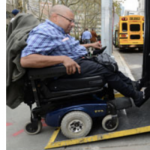On March 30, 2021, the Ninth Circuit Court of Appeals ruled in favor of C.L., an Orange County speech-language pathologist with PTSD and other disabilities, who trained and relies on her service dog, Aspen, to function in public and live independently. The ruling overturns a September 2019 U.S. District Court judgment that service dogs must be formally “certified.”
The unanimous three-judge ruling is the first appellate court decision in the nation addressing training and certification requirements for service dogs. The decision affirms federal regulations stating that persons may self-train service dogs to perform tasks related to a disability and are not required to undergo formal, often expensive and time-consuming, training programs.
The precedent-setting lawsuit, C.L. v. Del Amo Hospital, filed in March 2018 in the U.S. District Court, Central District of California, alleges that Del Amo Hospital of Torrance, California, improperly prevented C.L. from bringing her service dog, Aspen, with her during inpatient treatment. C.L. alleges that Del Amo failed to adhere to federal and state laws that mandate service dogs be permitted to accompany their handlers to all places where the public may go, including hospitals.
The court notes that the case “illustrates the benefits a trained service dog can provide to an individual with PTSD.” Unless appealed further, the case now returns to the district court for further proceedings.
“The court’s decision confirms the public policy of this country that people with disabilities tremendously benefit from service dogs, and that there are legitimate means of training dogs to perform tasks that help people live full, independent lives,” states DRLC Director of Litigation Christopher Knauf. “That this decision can help tens of thousands of people living in fear and isolation benefit from a trained service dog is immensely gratifying.”
“Today’s decision is an important and welcome development for people who use service animals to help with a psychiatric disability. Too often, misconceptions about the legitimate use of psychiatric service animals have needlessly restricted people’s lives and prevented them from using what is often the most effective intervention for a mental health disability,” states Jennifer Mathis, Deputy Legal Director of the Bazelon Center for Mental Health Law, in Washington D.C., co-counsel in the case.
Attorney Celia McGuinness of California’s Derby, McGuinness & Goldsmith LLP served as co-counsel, and Munger Tolles & Olson also served as counsel on the amicus curiae brief in support of C.L. and various national disability rights groups.
FOR IMMEDIATE RELEASE:
Tuesday, March 30, 2021
_______________________
CONTACT:
Christopher Knauf, Disability Rights Legal Center
(213) 736-1031 x1195; ck@drlcenter.org
_______________________
RESOURCES:
View this press release as a PDF.
View co-counsel the Bazelon Center’s press release as a PDF.
Download the Ninth Circuit ruling (PDF).
_______________________
PRESS COVERAGE:
Service dogs may be trained by owner and allowed into shops and restaurants, court rules | San Francisco Chronicle
Appeal Court Rules that “Certification” of a Service Dog Is Not Required by Law | BARK
Service Dog’s Ouster from Hospital May Violate Disabilities Law | Bloomberg Law
_______________________
ABOUT THE DISABILITY RIGHTS LEGAL CENTER:
Founded in 1975, the Disability Rights Legal Center is the nation’s oldest national non-profit public interest cross disability law center. The organization’s mission is to champion the rights of people with disabilities through education, advocacy and litigation. www.thedrlc.org



